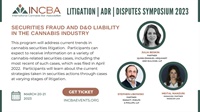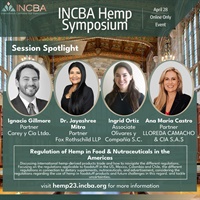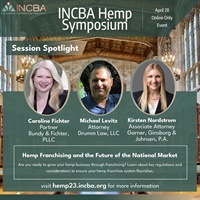Before you Buy: Check the Credit Tab to Make Sure Your Jurisdiction is Accredited!

- Average Rating:
- 11
- Bundle:
- Litigation Symposium 2023 On-Demand Bundle
- Categories:
- Litigation
- Faculty:
- Shane Pennington
- Duration:
- 1 Hour 6 Minutes
- Format:
- Audio and Video
- SKU:
- INCBA032023spotlightOD
- License:
- Short Description:
- Please join Shane Pennington (Counsel, Vicente LLP) as he discusses various aspects of Impact Litigation & the Changing Terrain in the legal cannabis market. This course’s topics will include: the current state of play, historical precedent that got us into the situation we are in today, and what the future may hold.
- Price:
- $30.00 - $75.00

- Average Rating:
- 7
- Bundle:
- Litigation Symposium 2023 On-Demand Bundle
- Categories:
- Litigation
- Faculty:
- Meital Manzuri | Julia Beskin | Stephen Libowski
- Duration:
- 55 Minutes
- Format:
- Audio and Video
- SKU:
- INCBA032123securitiesOD
- License:
- Short Description:
- This program will address current trends in cannabis securities litigation. Participants can expect to receive information on a variety of cannabis-related securities cases, including the most recent of such cases, which was filed in April 2022. Participants will learn about the current strategies taken in securities actions through cases at varying stages of litigation. Upon completion of this program, participants should expect to be able to identify common causes of action levied against cannabis-related entities and strategies those entities can implement to mitigate risk.
- Price:
- $30.00 - $75.00

- Average Rating:
- 17
- Bundle:
- Hemp Symposium 2023 On-Demand Bundle
- Categories:
- Hemp | Hemp Law
- Faculty:
- Jason Tarasek | Marie Sanchez | Kai-Friedrich Niermann | Andrea Steel
- Duration:
- 1 Hour 15 Minutes
- Format:
- Audio and Video
- SKU:
- INCBA042823caselawOD
- License:
- Short Description:
- Case Law Update: A comprehensive update on recent Hemp case law
- Price:
- $30.00 - $75.00
Tags: Hemp Symposium 2023

- Average Rating:
- 7
- Bundle:
- Litigation Symposium 2023 On-Demand Bundle
- Categories:
- Litigation
- Faculty:
- Stacey Jackson | Ian Stewart | Jasmine Wetherell | Bryna Dahlin
- Duration:
- 55 Minutes
- Format:
- Audio and Video
- SKU:
- INCBA032123liabilityOD
- License:
- Short Description:
- Evolving cannabis product risks have the potential to result in enormous future liability for which cannabis and hemp companies are currently unprepared. This session will clarify those risks and discuss how embracing a mix of legal reform, policy changes and adoption of traditional risk management principles may prevent future product risk issues from damaging market sustainability.
- Price:
- $30.00 - $75.00

- Average Rating:
- 13
- Bundle:
- Hemp Symposium 2023 On-Demand Bundle
- Categories:
- Hemp | Hemp Law
- Faculty:
- Marie Sanchez | Robert Hoban | Lorenza Romanese | Robert Jappie
- Duration:
- 1 Hour 4 Minutes
- Format:
- Audio and Video
- SKU:
- INCBA042823transatlanticOD
- License:
- Short Description:
- In this session the panelists will discuss international hemp-derived products trade. More specifically, the panelists will offer an overview of what transatlantic trade of hemp-derived products (food products, cosmetic products, vaping products…) for consumer use looks like with a particular focus on import and export of these products from the US market to the EU and/or the UK market(s) and from the EU and/or the UK to the USA.
- Price:
- $30.00 - $75.00
Tags: Hemp Symposium 2023

- Average Rating:
- 13
- Bundle:
- Hemp Symposium 2023 On-Demand Bundle
- Categories:
- Hemp | Hemp Law
- Faculty:
- Pamela Nicole Epstein | Courtney Moran | Shawn Hauser | Rusty Rumley
- Duration:
- 1 Hour 5 Minutes
- Format:
- Audio and Video
- SKU:
- INCBA042823farmbillOD
- License:
- Short Description:
- In this session the panelist will set the stage by discussing the Agricultural Improvement Act, more commonly known as the Farm Bill; specifically, the watershed moment in 2018 where industrial hemp was provided a federally legal pathway. The panel will discuss the unintended consequences created by the definition and function of weight allowance for delta-9 THC and its application to manufactured hemp derived products. The impacts of the definition on the hemp industry, the regulated marijuana industry and overall public health.
- Price:
- $30.00 - $75.00
Tags: Hemp Symposium 2023

- Average Rating:
- 13
- Bundle:
- Hemp Symposium 2023 On-Demand Bundle
- Categories:
- Hemp | Hemp Law
- Faculty:
- Susan Burns | Rod Kight | Glenn McElfresh | Jessica Wasserman, JD
- Duration:
- 1 Hour 2 Minutes
- Format:
- Audio and Video
- SKU:
- INCBA042823microcosmOD
- License:
- Short Description:
- Learn about the hemp-derived Minnesota Model and how it is viewed as a preview to what will happen on the federal level. As goes Minnesota, so goes the rest of the nation? Join local and national speakers for their analysis and predictions, who will also discuss novel/intoxicating hemp-derived cannabinoids and their regulation under both state and federal law, including Delta-8 THC, THC-O, and others.
- Price:
- $30.00 - $75.00
Tags: Hemp Symposium 2023

- Average Rating:
- 14
- Bundle:
- Hemp Symposium 2023 On-Demand Bundle
- Categories:
- Hemp | Hemp Law
- Faculty:
- Ignacio Gillmore | Dr. Jayashree Mitra | Ana Maria Castro | Ingrid Ortiz
- Duration:
- 1 Hour 3 Minutes
- Format:
- Audio and Video
- SKU:
- INCBA042823hempinfoodOD
- License:
- Short Description:
- The panel will focus on the regulations applicable to foodstuff in the US, Mexico, Colombia and Chile. In particular, we will discuss different regulations in connection to dietary supplements, nutraceuticals, advertisement and further challenging issues for the industry, to later focus on the approach that these regulations have regarding the use of hemp in foodstuff products and future challenges in this regard.
- Price:
- $30.00 - $75.00
Tags: Hemp Symposium 2023

- Average Rating:
- 10
- Bundle:
- Hemp Symposium 2023 On-Demand Bundle
- Categories:
- Hemp | Hemp Law
- Faculty:
- Caroline Fichter | Kirsten Nordstrom | Michael Levitz
- Duration:
- 1 Hour
- Format:
- Audio and Video
- SKU:
- INCBA042823franchisingOD
- License:
- Short Description:
- The franchise business model offers hemp business owners the opportunity to grow their brand nationally while reducing their startup and operational costs. It offers prospective hemp franchisees the chance to own their own business while benefiting from an established brand and operational system. But a poorly created franchise system or an “accidental” franchise, can expose hemp businesses to the risk of regulatory investigation, litigation, and the loss of key IP such as trademarks and trade secrets. Conflicting state regulations and the lack of significant federal guidance makes franchising a hemp business even more complex.
- Price:
- $30.00 - $75.00
Tags: Hemp Symposium 2023

- Average Rating:
- Not yet rated
- Bundle:
- CLI2023 On-Demand
- Categories:
- Consumption Law | Federal Policy | Litigation | Regulations | Regulatory
- Faculty:
- Ian Stewart | Kristina Dahmann | Marion Mariathasan | Barak Cohen | Neil Willner | Paul Demko | Eduardo Provencio, JD
- Duration:
- 1 Hour 15 Minutes
- Format:
- Audio and Video
- SKU:
- INCBA072023summaryOD
- License:
- Short Description:
- Cannabis law and policy continue to quickly evolve and the past year has seen major legal developments for the regulated marijuana and hemp industries. Moderated by Paul Demko, Cannabis Editor at POLITICO, this panel of experts bring their broad legal and policy perspectives to identify and comment upon important court rulings and litigation trends, as well as anticipated changes to the law heading into 2024 on a variety of legal topics.
- Price:
- $30.00 - $75.00

Product Type

Product Type

Product Type
- Faculty:
- Ian Stewart | Kristina Dahmann | Marion Mariathasan | Barak Cohen | Neil Willner | Paul Demko | Eduardo Provencio
Please wait ...